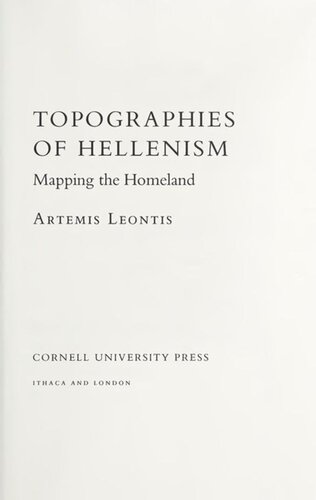

Most ebook files are in PDF format, so you can easily read them using various software such as Foxit Reader or directly on the Google Chrome browser.
Some ebook files are released by publishers in other formats such as .awz, .mobi, .epub, .fb2, etc. You may need to install specific software to read these formats on mobile/PC, such as Calibre.
Please read the tutorial at this link: https://ebookbell.com/faq
We offer FREE conversion to the popular formats you request; however, this may take some time. Therefore, right after payment, please email us, and we will try to provide the service as quickly as possible.
For some exceptional file formats or broken links (if any), please refrain from opening any disputes. Instead, email us first, and we will try to assist within a maximum of 6 hours.
EbookBell Team

4.0
36 reviewsHow do people map a homeland? How does the homeland define them? Focusing on the interrelations between culture and geography, Artemis Leontis illuminates the making of modern Greece. As she fashions a new approach to contemporary Greek literature, Leontis explores the transformation of Hellenism from a cultural ideal to a nation-state. In Leontis's view, a homeland exists not when it has been inhabited, but after it has been mapped. The mapping of Hellenism, she maintains, has required that modern Greek writers reconstruct a topos, or place, for Hellenism through their own national literature. Leontis compares literary topographies of Hellenism created by Greek poets, novelists, and intellectuals from the 1880s to the 1960s with those constructed by European travelers, diplomats, and scholars. In her discussion of both modern and ancient Greek texts, she reconsiders mainstream poetics in the light of a marginal national literature. Leontis examines in particular how poetry by the Nobel laureates George Seferis and Odysseus Elytis both incorporates ancient texts and uses experimental techniques. Charting the constellation of factors that influence our sense of place, collective identity, and tradition, Leontis confronts questions central to current national struggles throughout the world.